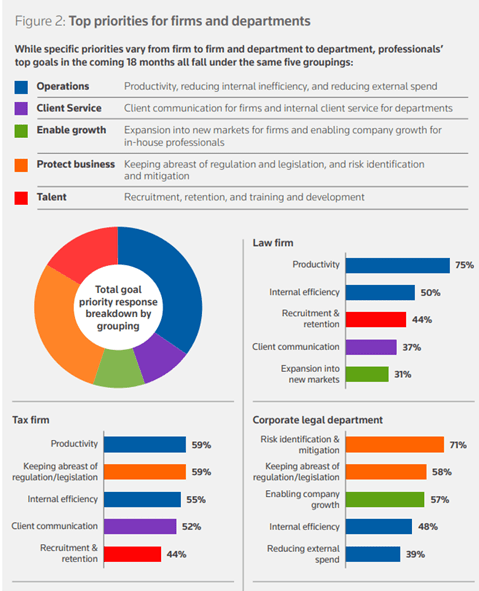General counsel provide leadership to help companies navigate risk and act on opportunities
In this three-part series, we will explore how legal teams can focus on the future. Here we will investigate how to help your company navigate risk. Later installments cover how to avoid being seen as a business blocker and implementing the right technology to drive your goals.
General counsel (GC) and their legal teams provide a unique leadership perspective in their businesses. They have one of the widest and deepest views of their organizations. They are at the table for some of the most critical strategic decisions – mergers, acquisitions, and bet-the-company litigation. They also work on sales contracts, employment disputes, and marketing plans.
The most future-focused GCs have parlayed their legal acumen and connection to the business to take a more strategic position. Instead of advising simply on whether something is legal, they offer counsel on whether decisions are legal, strategic, and right.
They’re providing critical leadership and guidance while also facing tightening resources. They need to create space to deliver on this strategic role, they are looking to technology like generative AI to enable their teams.
GCs as strategic advisors
According to the Thomson Reuters Future of Professionals report, in-house attorneys say their top three priorities are risk identification & mitigation, keeping abreast of regulation/legislation, and enabling company growth. (See Figure 1)
According to the report, “In-house teams will be repositioned from Cost Centers to Growth Enablers, with a stake at the Board table.” The beauty of this change is that in-house lawyers are more valued by the organization because they help advance growth plans, rather than simply pointing out risks and saying “no.”
They enable and guide contract and document management, outside counsel and other vendors management, enterprise legal operations, matter management and legal intake, among others.
The challenge is that resources are finite. Technology provides tools that free up time and resources, enabling GCs to focus on the wide range of business issues they are expected to handle.

Figure 1 The Future of Professionals report looked at legal and tax professionals across sectors. In-house attorneys are most focused on protecting the business, enabling growth, and optimizing operations
GCs provide leadership as businesses and industries change
The GC today needs to navigate a more complex organization, demonstrate strong analytical skills, and exhibit a deep understanding of strategic challenges. The COVID era brought years of rapidly changing regulations and government measures and a surge in workload from parts of the business that need quick, up-to-date advice.
Legal teams came out of the crisis having helped create more resilient organizations. They helped them to navigate immediate risks and anticipate future ones, providing innovative solutions to extraordinary problems.
And now? Now the world keeps changing, and GCs continue to show up as leaders, helping their organizations navigate more change, disruption, and opportunity.
Geopolitics: Decades of globalization have led to an increasingly connected world where businesses are global just by virtue of having a website. However, aspects of globalization are now under challenge, trade wars are becoming a little more common, and national interests and sovereignty are increasingly being pressed into service. With the right horizon scanning tools, the GC can offer legal insights into a range of political trends and events that ultimately affect daily business decision making.
Decision making: Lawyers’ unique training, way of thinking, analysis, and problem-solving skills can bring greater integrity to the decision-making process. However, the GC and the legal team must reflect a changing reality and be ready to guide the business through new risks. Legal expertise must be more extensive and brought into a variety of management processes at an earlier stage, integrating the role more closely into the business.
Communication: It is essential that the legal team communicates more effectively with business decision makers and a variety of other stakeholders. Lawyers can’t speak like lawyers — they need to have dialogue in ways that business leaders and stakeholders can understand, so they are inspired to build legal integrity into their processes.
Regulation costs: The increase in surveillance, data privacy concerns, big data, and a host of other issues have a legal importance that the GC needs to take a view on, and to promote that view through internal advocacy. In all these areas, the GC has a duty to question and test internal decision making, to ensure there is legal integrity running through organizational decisions and their deployment across the business. Rather than acting as a blocker or adding cost to a process, the legal team is helping enable healthy, sustainable growth by helping the organization avoid risk.
Setting your company up for success
GCs will find the most success in their strategic capacity if they embrace the role and adopt the technology and tools of the future. They can deploy technology to get the data right and work on effective communication to get the message right.
Corporate GCs have a critical leadership role to play in helping their organizations lean into generative AI in a responsible and growth-centered way.
According to Thomson Reuters CEO Steven Hasker, “it is becoming clear that AI-empowered professionals will outpace those who don’t take advantage of this era of transformation. However, before we allow ourselves to get swept up in the sensational headlines about bots automating professional jobs or entire industries being decimated at the hands of generative AI, the imperative is to look at the guardrails we have in place. This will be the true key to driving trust, encouraging adoption, and building on a steady foundation that lets users truly harness the opportunity.”
Some companies will face a bigger cultural shift than others. It is the GCs’ job to get their organization to make the shift, no matter how big it is. There are several ways the GC and legal department can effect change across the organization:
- Stay at the forefront of regulatory changes in multiple jurisdictions
- Manage the risks to which the business is exposed
- Set strategic priorities in business transformation
- Champion technology in the legal department that frees up lawyers to work on more complex tasks
Machines won’t replace expertise and wisdom, they’ll enable it. According Hasker, “Producing high-quality advice is the most important motivator across all industries. To continue this work in the era of generative AI, we need to reconsider and redefine what it means to be an advisor and evolve business models to prepare and service customers for tomorrow – not just today.”
_______________________________________________________________________
Legal solutions from Thomson Reuters help GCs and their teams step into the future, with AI-powered workflow and research tools that streamline their work and help them elevate their results.
AI and Thomson Reuters Discover how Thomson Reuters AI solutions are shaping the future of authentic legal practices.
_______________________________________________________________________












